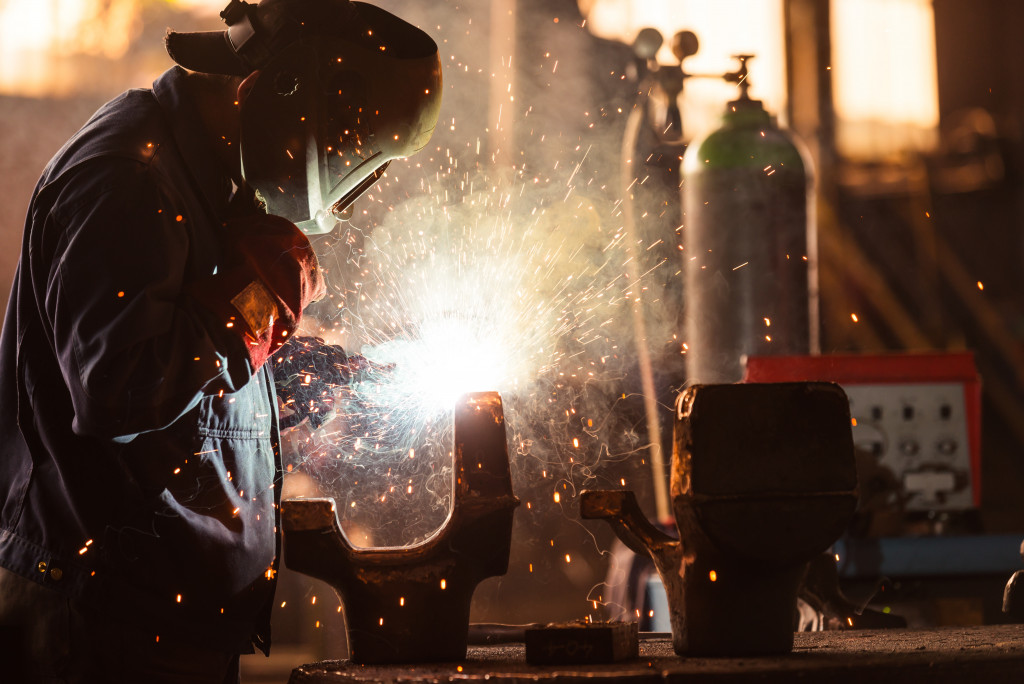- Manufacturing is an essential business process that drives economic growth and job creation.
- Companies must understand their needs and comply with rules and regulations to create a successful manufacturing space.
- Necessary resources such as plumbing, electricity, and ventilation are essential components of a functional production area.
- Adhering to industry standards can ensure quality products, while legal requirements provide operations conducted within the framework of government agencies or authorities.
Manufacturing is an essential process for businesses, as it helps to convert raw materials into products that can be sold and generate revenue. Manufacturing is at the heart of a successful business, as it drives economic growth and job creation. According to the US Bureau of Labor Statistics, in 2023, there were 11.9 million people employed in the manufacturing industry.
The importance of manufacturing extends beyond the number of people employed by it. Manufacturing has become more efficient with better technology and more innovative processes. This has allowed businesses to produce goods faster and more cost-effectively. Additionally, manufacturing innovation is helping companies create new products that offer improved features, higher quality standards, and more excellent customer value. Furthermore, due to globalization, many organizations have taken advantage of overseas manufacturing opportunities to reduce costs further while increasing productivity.
Your business might need manufacturing processes, making it necessary to prepare. Here are a few steps to consider when preparing for manufacturing:
Identify Needs
Having a clear view of what you need for your manufacturing process is extremely important, as it allows you to plan and strategize accordingly. Before beginning the manufacturing process, organizations must assess their current needs and identify any potential gaps in production. This will enable businesses to create more efficient operations by minimizing mistakes and ensuring suitable materials are used. Additionally, having an in-depth understanding of the materials needed for production can help organizations manage costs more effectively.
Moreover, assessing the necessary equipment, tools, and resources helps businesses save time on manufacturing and ensure that they use appropriate technologies to produce quality products. Furthermore, getting a clear view of what you need allows companies to stay up-to-date with current industry trends to make informed decisions about their production processes. This also helps organizations better anticipate customer needs by staying ahead of the competition with innovative ideas for new products or features.
Finally, knowing your needs will help you create a manufacturing floor layout. Your layout should ensure that all necessary resources are easily accessible and close to each other, helping streamline production processes.
Comply with Rules and Regulations

Complying with rules and regulations is essential to building a successful manufacturing space. Regulations ensure that organizations meet safety, industry, and environmental standards while providing a healthy work environment for their employees. Companies must adhere to local, state, and federal laws to protect their workers and customers and ensure their products are safe to use.
The following are some of the areas businesses need to follow when creating a manufacturing space:
Safety Regulations
Safety regulations are designed to protect both employees and consumers from potential risks associated with manufacturing processes. Organizations must adhere to all safety guidelines related to hazard control, chemical use, noise exposure, ventilation requirements, fire prevention measures, machine guarding practices, occupational health standards, and more to keep people safe from harm.
Environmental Regulations
Manufacturing operations can significantly impact the environment if not managed correctly. Organizations must comply with all relevant environmental regulations related to air quality control, water pollution prevention measures, waste management protocols, hazardous materials handling procedures, energy conservation strategies, and other relevant topics to lessen any negative impacts on the planet from their activities.
Industry Standards
Industry standards guide organizations on best practices when producing goods efficiently while maintaining high-quality consumer products. Companies should understand these standards to deliver goods according to customer expectations while meeting the required quality level for each item produced.
Legal Requirements
Organizations must know all legal requirements for running a business to operate legally within the framework set by government agencies or authorities at various levels (local/state/federal). This includes understanding labor laws related to employee rights and ensuring that taxes are paid appropriately according to jurisdictional regulations.
Providing Function for Manufacturing

When designing a manufacturing space, it is essential to consider the needs of both employees and customers. Proper plumbing, electricity, and ventilation are critical components to creating a functional space allowing workers to do their jobs safely while ensuring products meet quality standards.
Plumbing is integral to any manufacturing facility, ensuring a reliable water supply for cleaning and other processes used during production. It also helps sanitize the area and reduces the risk of illness or contamination from bacteria or viruses. In addition, reliable plumbing helps maintain safe pressure levels for necessary equipment such as boilers and turbines.
Electrical systems provide reliable power for all machines throughout the manufacturing process. Well-designed electrical systems help ensure the safe operation of all machinery by providing reliable power without any malfunctions or breakdowns that can lead to safety issues or production delays. You can hire reliable industrial electrical contractors to help you build a working manufacturing space.
Ventilation is also essential in a manufacturing facility as it helps keep the air clean and free from pollutants or chemicals used during production. Good ventilation will help reduce worker fatigue by keeping air temperatures comfortable and providing fresh air when needed. Additionally, good airflow can also prevent dust accumulation in the workspaces which could otherwise lead to unhealthy working conditions due to irritation or respiratory problems caused by airborne contaminants.
Final Thoughts
Manufacturing is an essential part of many businesses. However, it can be a time-consuming and complex process. Companies must have the necessary resources to create successful manufacturing operations, from having a clear view of their needs to following all safety and legal regulations. With the proper preparation, your business can be well on its way to creating a successful manufacturing space.




